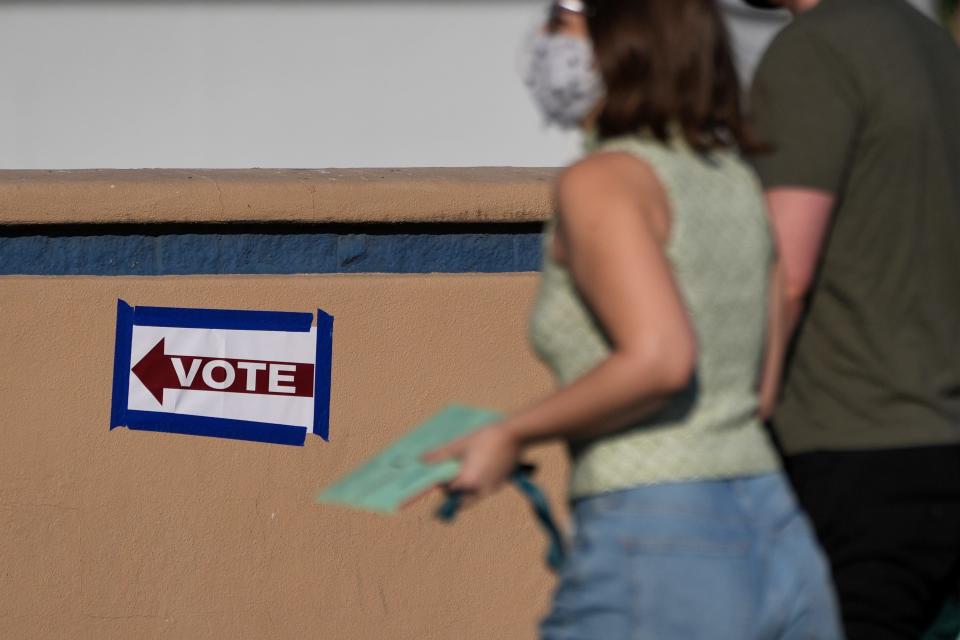Voting on Arizona judges: Here's what to know about those up for retention in Maricopa County

Maricopa County voters should expect to see 55 judges and justices on their ballot this year: those who sit on the Arizona Supreme Court, the Arizona Court of Appeals and the Maricopa County Superior Court.
In Maricopa County and any Arizona county with a population higher than 250,000, judicial retention elections decide which judges will keep their jobs. A majority of "yes" votes keeps a judge in office.
Pima and Pinal counties also have judges on the ballot. Coconino County, with a population of under 250,000, also voted to switch to the retention election process in 2018.
Judges go before the voters after their first two years in office. After that, voters reconsider them for retention every four years for trial court judges and every six years for higher court judges.
For subscribers: Supreme Court Justice Bill Montgomery gets lowest performance reviews
This year, three Arizona Supreme Court justices appear also on the ballot: James Beene, Bill Montgomery and Ann Timmer.
On the Arizona Court of Appeals, five judges are up for retention: Cynthia Bailey, Michael Brown, Kent Cattani, David Gass and Steven Williams.
Maricopa County voters will decide to keep or get rid of 47 Maricopa County Superior Court judges.
To aid voters, the Arizona Commission on Judicial Performance Review evaluates judges and justices.
It named only one judge in the entire state who failed to meet standards: Maricopa County Superior Court Judge Stephen Hopkins.

How Arizona judges are rated
The Commission on Judicial Performance Review has 34 members. Most have no active participation in the judicial process, with no more than seven of them allowed to be judges and no more than six allowed to be attorneys.
The commission surveys jurors, witnesses, attorneys, judges, court staff and parties to legal action about each judge. Based on those results, the commission then rates judges across five criteria:
Legal ability: The ability to decide cases based on applicable law and to demonstrate competent legal analysis.
Integrity: The freedom from personal bias to administer justice fairly, ethically and uniformly.
Communication skills: The issuance of prompt, understandable rulings and directions.
Judicial temperament: The ability to be dignified, courteous and patient.
Administrative performance: The effective management of courtroom, office and issuance of rulings in a prompt and efficient manner.
Judicial Performance Review Commission Chairman Mike Hellon explained the panel has a "shopping list of criteria," including legal knowledge, legal interpretations, "if the judge appears to be biased for racial, sexual, economic reasons and age," and "communicating completely and effectively with the people before him."
But the surveys are limited, according to Cathi Herrod, president of the conservative Center for Arizona Policy.
“The challenge with the Judicial Performance Review scores is that those scores primarily are based on surveys," she said, adding, "And sometimes it's a very small percentage that fill out those surveys.”
The Center for Arizona Policy puts out a voter guide highlighting some judges based on a series of questions about their judicial philosophy.
But its survey also has problems.
"Most of them do not answer those questions — for whatever reasons they choose not to — and so that restricts what we try to do," Herrod said.
Making the cut
Judges either meet the Judicial Performance Review standards or don’t.
The commission reviews all the judges on the ballot, and within the past 10 years, only four have not met the standards. There were two judges in 2014: Maricopa County Superior Court Judge Benjamin Norris and Pima County Superior Court Judge Catherine Woods, and two in 2016: Pima County Superior Court Judge Carmine Cornelio and Maricopa County Superior Court Judge Jo Lynn Gentry.
This year, Maricopa County Superior Court Judge Stephen Hopkins fell below the standards.
Fifteen commissioners voted that Hopkins did not meet the standards, compared with seven who thought he did. Hopkins, appointed to the bench in 2015, was reprimanded in June 2020 by the Commission on Judicial Conduct for unprofessional behavior after a prosecutor and a public defender joined in on a complaint.
Hopkins received his lowest scores from surveys filled out by attorneys who gave him a score of 79% in temperament and 83% in legal ability.
Another judge to come close to falling short of the standards this year was Maricopa Superior Court Judge Howard Sukenic. Thirteen commissioners voted that Sukenic met the standards, while nine said he did not.
He received his lowest scores in temperament form from the witness and attorney surveys, which ranked him with a score of 74% and 75%, respectively.
According to Hellon, temperament is what lands a judge "in trouble the quickest."
A negative score in temperament means the person has been "rude, dismissive, does not listen well to two people who appear before him or her, and generally does not have a professional demeanor in the courtroom," Hellon said.
Supreme Court justices
There are three judges up for retention in the Arizona Supreme Court.
James Beene
Authored four opinions this year and had zero dissents.
He authored the majority opinion in State v. Agueda, ruling that the charge of contributing to delinquency of a minor is not a lesser or included charge to sexual conduct with a minor and each count can be charged separately.
He received 28 votes from commissioners who found he met the standards and zero who found he did not.
He received 100% scores in all categories from peer judge surveys, superior court judge surveys and most of the attorney surveys.
His lowest score of 88% was in administration performance from attorney surveys.
Ann Timmer
She authored nine opinions this year, with one dissent.
She authored the court's opinion that keeping juror’s names anonymous remained constitutional in the Leibsohn v. Hobbs case.
She joined the dissent in Rogers v. Young, in which the court decided that during political attack ads, collateral damage against people associated with the candidate being attacked was not libel as long as those people remained unnamed. The dissent felt that in this case a reasonable person would make the connection between the political attack and third party.
She received 28 votes from commissioners who found she met standards and none who did not.
She received 100% scores in all categories from peer judge surveys and most of the superior court Judge surveys. Her lowest score was a 95% in administration performance from attorney surveys.
Bill Montgomery
He authored four opinions with one dissent this year.
He authored the court's opinion that remanded State v. Willis. The court believed there had been evidence not shown to the grand jury during the criminal indictment that would have been exonerative.
He joined the dissent in the State v. Fierro case, where the court held that a home buyer and a builder could not overwrite the initial contract if it removes liability from the builder for faulty construction discovered after the sale of that home. Dissenting jurists found that "competent individuals" should be able to apply for a new contract if they do it voluntarily.
He received 19 votes from commissioners who said he met standards and two who said he did not.
His lowest score came from the attorney surveys, scoring him a 67% in temperament.

Election guide: November 2022
City races | School boards | State | Governor
| Ballot measures | Federal races | How to vote
Appellate judges
Five judges are up for retention from the Arizona Court of Appeals.
Cynthia Bailey
She received 22 votes from commissioners who said she met the standards and zero against.
Her lowest scores came from attorney surveys, with a score of 78% in legal ability and 87% in integrity.
Michael Brown
He received 28 votes from commissioners who said he met the standards and zero against.
His lowest scores came from attorney surveys, with a score of 93% in legal ability and administration performance.
Kent Cattani
He received 28 votes from commissioners who said he met the standards and zero against.
His lowest scores came from attorney surveys, with a score of 84% in legal ability and an 88% in administration performance.
David Gass
He received 28 votes from commissioners who said he met the standards and zero against.
His lowest scores came from attorney surveys, with a score of 87% in legal ability and an 89% in communication.
Steven Williams
He received 28 votes from commissioners who said he met the standards and zero against.
His lowest scores came from Superior Court Judges, with a score of 91% in legal ability and from attorney surveys, with a temperament score of 92%.
Reviews for Maricopa County Superior Court judges
This year Maricopa County has 47 judges up for retention.
Voters can find the reviews for every judge on the ballot on the Judicial Performance Review website www.AZCourts.gov.
The commission posts its votes and survey details on its Judicial Report page where users will find a list of judges and justices based on jurisdiction.
Below are the Judicial Performance Review scores for each of Maricopa County Superior Court judges and performance reviews from attorney surveys.
Reach crime reporter Miguel Torres at Miguel.Torres@arizonarepublic.com or on Twitter @TheMiguelTorres.
This article originally appeared on Arizona Republic: Arizona judges: What to know when voting on retention in election

